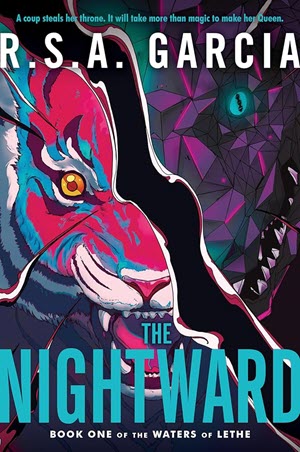The Nightward
 I’m delighted to see the career of RSA Garcia flourishing. Aside from her being an SF&F author, we talk a lot about cricket on social media. She won this year’s Sturgeon Award for ‘Tantie Merle and the Farmhand 4200’, an engaging tale of an old lady, a farm robot and a goat. The Nightward is her second novel. The first was Lex Talionis, about which I interviewed her for Ujima Radio some ten years ago. You can find that interview here.
I’m delighted to see the career of RSA Garcia flourishing. Aside from her being an SF&F author, we talk a lot about cricket on social media. She won this year’s Sturgeon Award for ‘Tantie Merle and the Farmhand 4200’, an engaging tale of an old lady, a farm robot and a goat. The Nightward is her second novel. The first was Lex Talionis, about which I interviewed her for Ujima Radio some ten years ago. You can find that interview here.
While Lex Talionis is science fiction, The Nightward is clearly fantasy, at least at first look. It has a map, and people who do magic. The publicity for the book connects it to The Witcher. That’s primarily because it shares the concept of forces of chaos erupting into the world and unleashing bizarre monsters on the unfortunately human kingdoms. (Well, not kingdoms, queendoms. More of that later.)
Something else that the book shares with The Witcher is a rather freeform approach to worldbuilding. While the society is broadly mediaeval in nature, Garcia brings in Caribbean mythology, names from ancient Greece and modern Europe, and a whole lot else. The map is, well, odd. I’m not an expert in geography, but it seems weird to me. All of this may be off-putting to people who are heavily into fantasy worldbuilding. Please don’t let this be you.
One of the clichés of this sort of epic fantasy is that there is an Evil Overlord whom the good guys must overcome. Garcia has avoided that simplistic approach. While the book does open with an act of great villainy, we soon discover that the supposed bad guys all have reasons for what they have done. Only one is a genuinely selfish megalomaniac.
Our heroine, meanwhile, is something of a Disney princess. But Viella is a young teenager when the book opens, with very little understanding of the world and a headstrong selfishness born of privilege. She’s a good kid, but she has a lot to learn.
I promised you queendoms. The other fascinating aspect of the book is the gender politics. This is a world ruled by women, save for one small part of the map where men rule. These are not separatist communities, and that inevitably destabilises the politics. When the book opens, Viella’s mother, High Queen Elise, is about to enact legislation to give men more rights. This is too radical for the conservative elements of society, and not radical enough for others.
The world of book is also one in which magic is primarily done by women. Men who have magical powers are often seen as dangerous. However, there is a particular dangerous class of magic users known as the Unbound, and they are dangerous (and powerful) precisely because they are not bound to one binary gender or the other.
Finally I should note that this is not exactly fantasy. It becomes clear very early on in the book that what we are seeing is an post-scientific world, in which all sorts of ancient technological secrets are there to be discovered. The magic that the various characters do may all be uses of technology that they do not fully understand. The goddess Gaiea, whom all the queendoms revere, may be one of these ancient scientists, or a product of their messing with genetics. We’ll have to read book 2 to find out.
As you can see, there is a lot going on in this book. And Garcia throws in a bunch more ideas right at the end. As I said before, the worldbuilding is very eclectic. But sophisticated worldbuilding is not what Garcia is trying to do here. She is much more interested in a good story, and in thinking about gender politics.
The other point that I must mention here is that Garcia has achieved all of this while battling cancer. Healthcare in Trinidad is not cheap. She has a fundraising page to help with the expense. If you read and enjoy this book, do please consider donating so that she can write more.

Title: The Nightward
By: RSA Garcia
Publisher: Harper Voyager
Purchase links:
Amazon UK
Amazon US
Bookshop.org UK
See here for information about buying books though Salon Futura